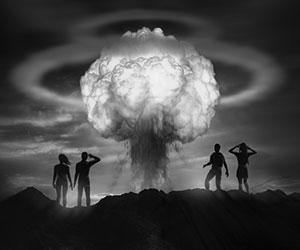On the Beach
Select Format
Select Condition 
Book Overview
Nevil Shute's most powerful novel--a bestseller for decades after its 1957 publication--is an unforgettable vision of a post-apocalyptic world. After a nuclear World War III has destroyed most of the... This description may be from another edition of this product.
Format:Paperback
Language:English
ISBN:0345311485
Release Date:September 1983
Publisher:Ballantine Books
Length:278 Pages
Weight:0.36 lbs.
Dimensions:7.0" x 0.8" x 4.3"
Customer Reviews
6 ratings
What a great book about the fallout and carnage of war
Published by Ohokaay , 10 months ago
.
Slow burg min with a gut punch ending.
Published by Amanda W. , 1 year ago
Wow. So it starts slow, after the bombs have already dropped. I feel like the population portrayed was calmer than we’d actually be if faced with imminent death. Of course this book is from the 50s so maybe they really were made of stiffer stuff back then. Then ending, when it comes, is heart rending.
Arguably the most significant of the nuclear holocaust novels
Published by Thriftbooks.com User , 18 years ago
"On the Beach" was one of the first novels to describe what the aftermath of a nuclear war would be like, although the genre of post-apocalyptic novels goes back at least to Robert Cromie's "The Crack of Doom" in 1895. Edgar Rice Burroughs's Martians used radium bullets in 1912's "A Princess of Mars" and Upton Sinclair's 1924 novel "The Millennium: A Comedy of the Year 2000" involved atomic weapons. J.B. Priestly's "The Doomsday Men" in 1938 used radioactive material to disrupt the earth's crust. There was a nuclear war in the background of George Orwell's "1984," and the same can be said for the Ray Bradbury collection of short stories, "The Martian Chronicles." Nevil Shute's "On the Beach" was published in 1957, which was the same year that the Soviets launched Sputnik and Nikita Khrushchev boasted of a super bomb that could melt the polar icecaps. That might explain why this became the most prominent nuclear war novel of the decade, if not for that entire generation. Shute quotes T.S. Eliot's "The Hollow Men" on the title page with the famous lines "This is the way the world ends / Not with a bang but a whimper," and indeed the novel is not about surviving the war but awaiting the end of the world. Given what we now know about nuclear winter, Shute's pessimism is actually somewhat understated, but that does not make it any the less disturbing. "On the Beach" is set in Australia, two years after the war of which all anybody knows is that it put so much radioactive fallout into the atmosphere that there are eight months left before it reaches Down Under, where humanity is making its last stand. Unlike books like "Alas, Babylon" by Pat Frank in 1959, which deal primarily with how people try to keep on living civilized lives in the wake of an all-out nuclear exchange, "On the Beach" is about facing the inevitable end. Jonestown was still a couple of decades away and the story of the mass suicides at Massada was a minor historical footnote, so when the book was published there was nothing to color the horror of a continent of human beings choosing to end their lives with pills rather than succumb to the slow death by radiation poisoning (for that matter, there was not an active cultural debate on euthanasia either). There might not be anything more unrealistic in the novel than the idea that the scientific inevitable of the coming radiation is universally accepted. Yet that is a major factor in creating the depressing nature of the novel. The focus of the novel is on a group of characters. Scientist John Osborne provides the necessary scientific details while tuning his racing car for the world's last Grand Prix. Peter and Mary Holmes are spending their final days taking care of their baby daughter and planning a garden they will never live to see. Their friend Moira Davidson chooses to sedate herself by constantly drinking, until she meets Dwight Towers, captain of the U.S.S. Scorpion, which makes him the highest ranking officer
"Normalcy" In The Face Of Our Species' Self-Imposed Demise
Published by Thriftbooks.com User , 19 years ago
As radiation from a nuclear war that destroyed all life in the northern half of the earth gradually spreads southward to deliver its poison to all who live there, a number of Australians and a handful of Americans who reside among them attempt to continue some facet of normal life, even when the time for all things is nearly done. We learn going into this foreboding novel that at most one year remains to even the most fortunate of those yet alive. We read along as the last of humankind pathetically (or is it with dignity?) plant gardens, play with their children, reform from their alcoholism, fall in love, race cars...the list could go on and on. What must it be like to dwell under these horrible circumstances? What must it do, for instance, to the mind of a devout theist when she sees the deity to whom she has maintained lifelong faith is not going to arrive deus ex machina to save her and make everything right again? What must utter and complete moral hopelessness be like? How horrible must it be to be young and rise each morning knowing the despair that would come with so many hopes lying before you, now impossible to ever fulfill? And what must it be like to be a parent and understand that the children you bought into a terrible world reeling in extremis, will die in a matter of weeks? On The Beach is not about exploding cities and geo-political confrontations. The war and the nations who fought it are distant, quiet memories, barely of significance. On The Beach is about people, and how those people carry on in the face of a doom they neither created nor can elude. It is one of the darkest works of fiction ever produced, and also one of the finest. If it impacts a jaded modern reader so startlingly, what must it have been like to read this fifty years ago when the very concept of global extinction after nuclear conflict, was new? A universal, eternal classic of the Cold War era.
Is This How It Ends?
Published by Thriftbooks.com User , 22 years ago
I generally post my book reviews within days of finishing them, while they are freshest in my mind. However, in a strange twist of fate, I read ?On The Beach? during the second weekend in September of 2001, and I don?t need to remind anyone what happened on the following Tuesday. When I closed the book, I had chills up my spine, but at the same time I was relieved, complacently sure that the events described by Nevil Shute could never happen. After all, the Cold War ended years ago. Then, just days later, the world as I knew it was suddenly changed, and the impossible was possible once again. During those first few surreal days after September 11th, I found my thoughts returning to this book time and time again as I stared at the horrifying images on my TV screen and listened to the chilling speculation about what would happen next. But each time, I consciously pushed it out of my mind, because it was suddenly hitting a little too close to home.Even before the specter of nuclear war became a more tangible threat, this was a frightening book because it?s so realistic (despite the scientific inaccuracies ? keep in mind, this was written half a century ago). Other reviewers have complained that there?s not enough action, but think about it ? if you knew you were going to die in a few months and there was nothing you could to do to prevent it, what would you do? I think most of us would find ourselves spending our final days more in the manner of Shute?s characters than like anyone in a Bruce Willis film. We?d be the young married couple, tending our prized garden and cherishing our baby daughter. We?d be the lonely naval commander, dreaming of the wife and children we lost. We?d be the party girl, cramming in all the good times we could. In other words, we?d be doing what we knew for as long as we could, until we were forced to face the unknown. Maybe we?d try something we?d always dreamed about, like the Grand Prix, if the opportunity came along. Maybe, like Moira, we?d grow a little, and salvage something out of what remained of our life. But there wouldn?t be any Hollywood style heroics to save the universe. If you?re looking for a Die Hard type action adventure story, this is not the book for you. If you want a subtle, thought provoking psychological drama, it is.
Cold war fiction at its best.
Published by Thriftbooks.com User , 24 years ago
On The Beach is the story of the results of a nuclear war and the last days left for those that survived it. The war pretty much has annihilated the Northern Hemisphere, with the remaining population living mostly in Austrailia, where most of the story takes place. We watch as these people, knowing that their time is limited due to the "nuclear cloud" that is slowly drifting towards the southern hemisphere, live their last months to their fullest. We have the Navy, headed by the Austrailians and one American, sailing to the north in search of survivors of this war. We have people like you and I, living in Austrailia, going about their every day lives, living as if there IS a tomorrow, as if there IS a next year. The tension increases as the story heads towards the end, and the reader knows there is no mistaking what that end would be. There is no blood or gore in this post-nuclear war story. If you want that, rent MAD MAX. This book is about people living every day,knowing that their lives are about to be cut short. It's about people dying with dignity. And it's about the devastation of war, and the stupidity that can cause a nuclear war in our own futures.Nevil Shute's ON THE BEACH is a classic. If you want to read a great nuclear war/end of the world book written before the end of the Cold War, this is it.
On the Beach Mentions in Our Blog

My Guilty Obsession
Published by Violet • May 20, 2020
This is my confession. I'm ready to share my story and set myself free of guilt for loving Young Adult dystopian fiction. Journey with me down the twisting road that led me here, and explore some of my favorite titles I found along the way.

What the Cool Grandmas are Reading
Published by Catie Baldridge • October 25, 2018
As all true book nerds and lovers of literature already know in their souls, reading is a lifelong passion that transcends all...no matter what life throws at you, books will always be there. So, what ends up on the "All-Time Faves" list of someone who’s been reading for seven decades? Thanks to a ThriftBooks employee’s blogger grandma, you’re about find out!






